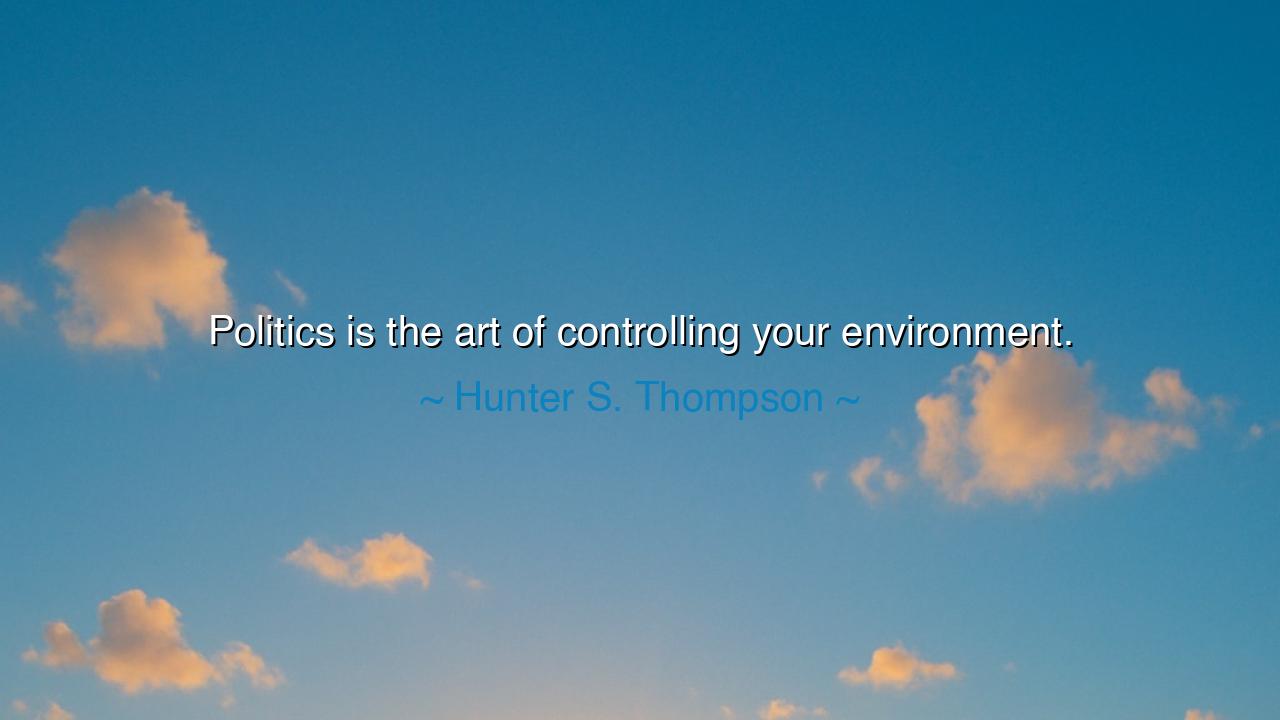
Politics is the art of controlling your environment.






The words of Hunter S. Thompson — “Politics is the art of controlling your environment.” — strike with the raw clarity of a man who saw behind the masks of power. Thompson, the prophet of Gonzo journalism, was no court philosopher but a rebel voice, exposing the machinery of deceit and ambition. In this phrase, he reduces the grand theater of politics to its essence: the eternal struggle to shape the world around oneself, bending circumstance and people alike to one’s will.
The meaning is both cynical and true. To many, politics is dressed in noble words — service, duty, democracy — yet Thompson insists that beneath the ceremony lies a primal force: control. Leaders and citizens alike practice this art whenever they shape laws, direct wealth, or even sway opinion. To control your environment is to master the forces that might otherwise crush you, to bend chaos into order, or sometimes, into tyranny. His words strip away illusion, revealing the bone beneath the flesh of rhetoric.
History offers us countless examples. Consider Franklin D. Roosevelt, who during the Great Depression transformed the environment of despair into one of cautious hope. Through the New Deal, he did not merely govern; he reshaped the very fabric of America’s economic life. His mastery of politics was not in lofty speeches alone, but in his ability to control the environment — to calm the banks, rally the jobless, and inspire trust even in the face of ruin.
Yet there is also danger in these words. For if politics is only control, then the line between governance and domination grows thin. Napoleon Bonaparte, too, mastered this art. He seized chaos after the French Revolution and forged order, but his desire to control his environment expanded into conquest, consuming Europe in war. His rise and fall remind us that control, without restraint, transforms the art of politics into the tragedy of empire.
Let this wisdom be handed down: politics is indeed the art of shaping one’s surroundings, but true mastery lies not only in control, but in vision. To control without purpose is tyranny; to control for justice is statesmanship. Thompson’s words, though spoken in cynicism, remind us of a timeless truth — that power is the ability to command the forces around us, but wisdom is knowing why and to what end we wield that power.






P7Nguyen Viet Phuc 7B
Hunter S. Thompson’s idea that politics is about control resonates deeply with current global politics, where it often feels like leaders prioritize consolidating power. But does this quote suggest that all political action is inherently manipulative? Is there room for politics to also be about collaboration and improving lives, or is control always at its core? How do we differentiate between effective governance and power plays?
TBBUI THI BICH
It’s unsettling to think of politics as the art of control, as Thompson describes. If politicians are essentially aiming to control their environment, does this mean that true democratic representation becomes secondary to maintaining influence? Shouldn’t politics be more about fostering collaboration and equitable growth, rather than control? How can we navigate a system that thrives on the manipulation of power dynamics?
KL18. Tran Khanh Linh
Thompson's quote brings to mind the darker side of politics—the way in which it can be used to shape and control not just laws but people's lives. If control is the ultimate goal, how do we ensure that politicians are working for the people rather than just their own interests? Can politics ever be free from the desire to control and manipulate, or is that an inherent part of the process?
DKVo Duy Khanh
Politics as a form of control makes me question the transparency of political systems. If the goal is to control your environment, does this mean politicians are constantly shaping perceptions, rather than offering solutions? How much of political discourse is just about control through narratives and agendas? Is it possible to practice politics without manipulating the environment around you?
MKTRAN MINH KHOI
This quote really makes me reflect on the tactics used in politics. If controlling your environment is the ultimate goal, does that mean that any action can be justified as long as it leads to that outcome? Are politicians more focused on maintaining power than genuinely improving the lives of their constituents? How can we hold leaders accountable for their manipulation of environments?